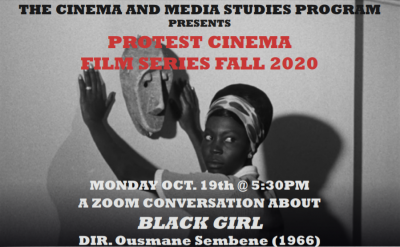In the wake of a reinvigorated Black Lives Matter movement, Boston University’s Cinema and Media Studies Program focused this semester’s film series discussion on “Protest Cinema.”

The series of three films and Zoom discussions was organized by Jennifer Cazenave, an assistant French professor who teaches courses in transnational cinema. Students and faculty are encouraged to watch these movies independently before participating in Zoom conversations guided by a professor specialized in the given topic.
The program held its second conversation Monday on the 1966 film “Black Girl,” written and directed by Ousmane Sembène. The sole francophone film out of the three, the movie follows the journey of a young Black girl, Diouana, who moves from Senegal to France to work for a wealthy French couple.
Cazenave said the BLM movement’s “significant impact” in France incentivized Cinema and Media Studies to incorporate one French movie into the series. The film deals most notably with themes of race and gender as Diouana experiences harsh treatment and alienation from her host family.
Zoey Mikalatos, a sophomore in the College of Arts and Sciences, is a part of the French Cluster at the Global House, a living community for students who are passionate about languages and cultures. Mikalatos, who attended the discussion, said in an interview the theme of colonization in “Black Girl” allows viewers to reflect on present-day society.
“It’s really important because it shows the lingering colonial mindset of the French people, even following Senegal’s independence,” Mikalatos said. “A lot of those colonial mindset issues continue to this day, so it’s very interesting to see how they were at that time so that their effects on the modern world can be seen.”
French professor Odile Cazenave was Monday’s main speaker. She said in an interview that “Black Girl” is a story that held influence, defining future African films “for years to come.”
“After that, a film from 1966, several films in the late ‘60s, ‘70s, ‘80s and the ‘90s and on to the present, go back to this initial theme of a dream of someone wanting to leave Senegal or an African country to go to France,” Cazenave said. “That’s a theme of exile, a theme of migration.”
Mikalatos said during the event although the film doesn’t have scenes specifically depicting protest, it still can be seen as protest cinema.
“It doesn’t need scenes of protests, necessarily, but the focus on post-colonialism and how there was still that lingering mindset of colonialism,” Mikalatos said, “especially in the way that they treated her, is what makes it protest cinema.”
By looking at non-contemporary movies, Jennifer Cazenave said in an interview after the event, audiences are able to revisit themes that persist within their society today.
“The idea was to establish a dialogue looking at films that are older,” Jennifer Cazenave said, “how these older films allow us to raise questions that are still relevant for today and for thinking about questions of race and gender and protest in the contemporary moment.”
Odile Cazenave said the director of “Black Girl” viewed film as a more inclusive artistic medium, in terms of education level and socio-economic status, than literature, which he viewed as reserved for the elite.
“The visual, the image, were more directly accessible to a larger audience,” Odile Cazenave said. “Whether the audience was educated or not, that was available to everyone.”
Early movies are especially relevant in modern times, she added, because they allow viewers to look back and see a continuation of themes.
Jennifer Cazenave said film is an important medium in talking about the BLM movement because images play a vital role in protests.
“It seemed important to me, and I think my colleagues as well, to think about how cinema has raised questions of witnessing,” Jennifer Cezenave said. “I think a lot of the questions that are being raised today is, ‘What does it mean to witness an event?’ whether directly or through the media.”
She said “Black Girl” inherently fosters ideas and conversations that are central to the BLM movement, as well as to all forms of protest.
“Witnessing and listening and being part of a community are really crucial to what’s going on,” Jennifer Cazenave said. “These are questions that cinema has been raising for a long time.”
























































































































